
November 8
1914 Various:
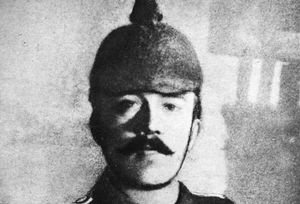
List Regiment: At dusk, Gefreiter Adolf Hitler's 1st Company, 16th Bavarian Reserve Infantry, takes up position in a line of trenches before Messines. The night does not pass well, however, as the men find themselves sporadically firing at mysterious, shadowy shapes, which are randomly illuminated by the flickering lights of the battlefield. Dawn reveals�not the collection of fallen Frenchmen the men expected to find�but the bloodied corpses of what had been a small herd of cattle. [For further details, Click here.]
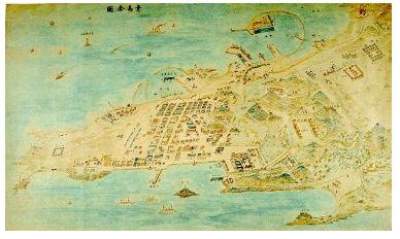
World War I: German Reaction to the Fall of Tsingtao: A Newspaper Commentary by Rear-Admiral Schlieper:
A solemn heritage have these words become, these words which the governor, naval Captain Meyer-Waldeck, just managed to have transmitted by telegraph to his Commander-in-Chief, from far-away Kiau-chau as a characteristic German pledge. Each one of us here in the Fatherland, clearly realizing that the message voiced much bitter tragedy, was grateful in his inmost soul to the brave man. Those of us, however, who had been permitted to witness that which out yonder had been undertaken and developed with enthusiasm and flaming love of country, will to-day, on the morning of November 8th, have felt especially sorrowful when they read these words: "Tsing-tau has fallen!" The flags were yet waving in celebration of the German naval victory along the coast of Chile off Coronel - and already there comes in the quick succession of events the solemn tidings of the end of an heroic struggle, which was maintained on a rocky height against gigantic odds. [For further details, Click here.] Click to Enlarge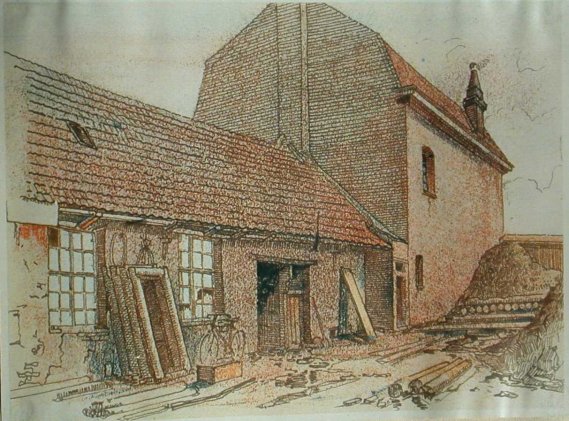
Fromelles Watercolor, 1915, by Hitler
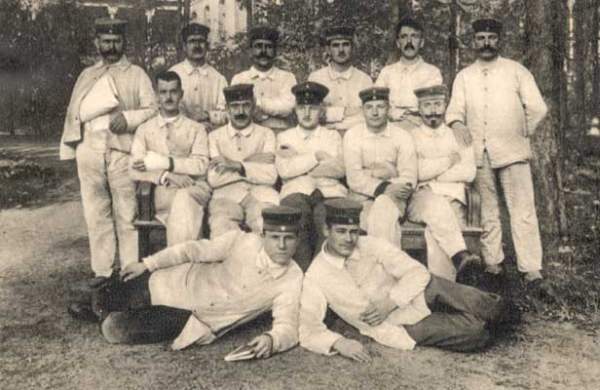
1917 Various:
Russian Revolution:By evening, Petrograd is firmly in the hands of the Bolsheviks. A new Government headed by Lenin is quickly organized. Trotsky becomes Commissar for Foreign Affairs and Stalin Commissar for Minorities. They soon take the name: Council of the People's Commissars. Fighting in Moscow will continue for several more days.
The Second All Russia Congress of Soviets proposes that all combatant nations begin immediate negotiations on concluding a just, democratic peace without annexations or indemnities.
Kerensky escapes to Finland, and then travels on to Paris. He will eventually settle in New York City.
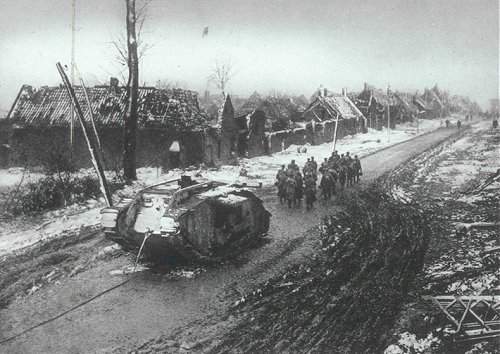
1918 Various:
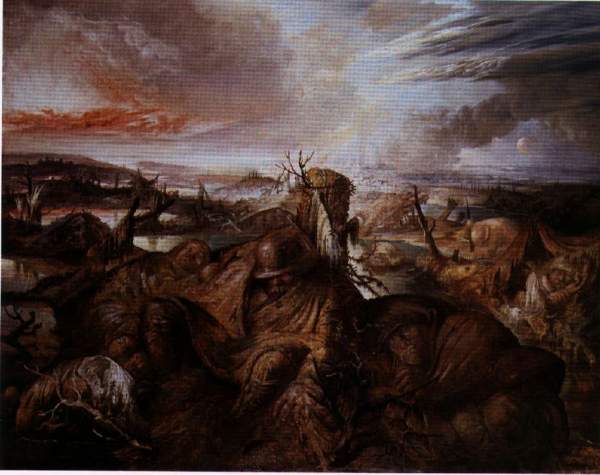
1918 World War I (Oct 15 - Nov 10): Gefreiter Adolf Hitler, blinded in a gas attack near Werwick on Oct 14, recovers in the Prussian Reserve Hospital at Pasewalk near Berlin. The doctors at this army hospital, on the cutting edge of medical treatments for gassed soldiers, provide Hitler with very good care, and his sight slowly and painfully begins to return to him over these few weeks. Hitler falls into a deep depression. After over four years on the front lines, his fighting days are over. In four years of war, the List Regiment has lost 3,754 dead, 8,795 wounded, with 678 taken prisoner. This is somewhat above the average for the German Armed Forces as a whole.
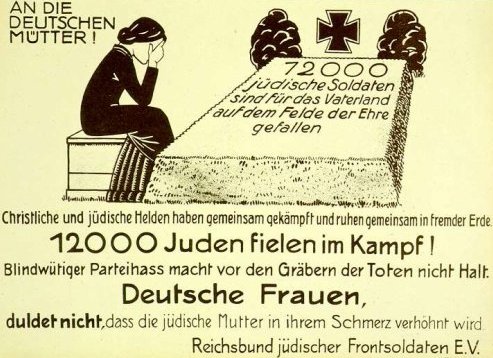
Throughout the length of the war, fifty-nine Jews served in the List Regiment, sixteen of these as officers. Thirty percent of the Jews in the List Regiment were honored for bravery, and seventeen percent were killed in action.[For further details, Click here.]
Weimar: Philipp Scheidemann, a Social Democrat and cabinet member, hastily proclaims a republic in order to prevent a Communist takeover, he says, by Karl Liebknecht and his extreme Spartacus League. Frederich Ebert, another Social Democrat, reportedly is outraged. A constitutional monarchy had already been agreed upon, not a republic . . . . The decision proved irrevocable. Scheidemann continued to serve as a leader in the Provisional Government which followed for the next several months.
Two hours after Scheidemann proclaimed the Weimar republic, Karl Liebknecht proclaims a Soviet republic from the balcony of the Berlin Palace. Hundreds of thousands of Berliners surge into the streets and charge the center of town shouting revolutionary slogans under red banners. The mob murders scores of army officers and occupies the Ministry of War and nearly all the important governmental buildings. "The mass of the German people are with us, the power of the accused enemies of the working class has collapsed; but they are nevertheless making all attempts to deceive the people, with a view of protracting the hour of the liberation of the German people . . . . Armistice Negotiations: The Coming of the First German Emissary as Reported by the French Captain at the Outpost at Chimay:
Notice had reached me that an envoy might arrive and that fire had ceased in our sector. About 3 o'clock in the afternoon a German lieutenant appeared. He was magnificently turned out and magnificently mounted, and had an escort of two men. I met him about a hundred yards in front of our lines, and he wished me to go back with him to meet the plenipotentiaries. I told him I could not leave my command; and at first he made some demur, the idea of those with him being that a French officer should accompany the plenipotentiaries from the other side of the line. I assured him there would be no firing in the sector, that the plenipotentiaries could cross the line in safety, and that I would receive them at my post of command. "This gentleman is an officer," he said to the men with him, "and as an officer I can accept and trust his word." Five o'clock was the time fixed for the arrival of the delegates, but at that hour no one arrived, the mission, as is known, actually making their appearance considerably later in the evening, when they at once proceeded on their way.
British Eyewitness Report of Armistice Negotiations:
The roads were a mass of mud, motor-cars of all sorts were ranged by the side of the main street, and the German plenipotentiaries were temporarily halted because of a breakdown to a motor lorry in the road in front of them. There were seven cars in all, two of them belonging to French Headquarters and five being German. The plenipotentiaries must have halted for nearly half an hour, and certain members of the junior staff attached to them got down while the details of a fresh route to be followed were discussed by them with the French officers by whom they were being escorted.
The senior members remained in the cars, invisible in darkness. Those we saw were of the typical officer class, clean-shaven and almost aggressively self-contained. For the most part they were silent, but occasionally they talked in low tones. On the pavement by the houses there was a continual movement of French soldiers. No guard was round the cars, for any sort of guard was entirely unnecessary. There was not a single individual among the two or three hundred men present who even moved forward to catch a glimpse of the mission. There was no question as to any one doubting their identity, for the cars bore on their panels the crest of the Black Eagle.
The demeanour of the French soldier was typical of the high standard of courtesy set by Marshal Foch. Both army and nation realized that with Marshal Foch in command the terms of the armistice were in absolutely safe hands, as he had abundantly shown that he had taken to the full such measures as the situation required. He insisted, however, that every detail of the transaction should be conducted in absolute privacy, and there was not present at the historic meeting a single representative of the French or allied press.
1923 The Munich (Beerhall) Putsch:
Hitler and the Nazis hatch a plot in which they would kidnap the leaders of the Bavarian government and force them at gunpoint to accept Hitler as their leader. Then, according to their plan, with the aid of famous World War One General Erich Ludendorff, they would win over the German army, proclaim a nationwide revolt and bring down the German democratic government in Berlin. They put this plan into action when they learned there would be a large gathering of businessmen in a Munich beer hall and the guests of honor were to be the Bavarian leaders they wanted to kidnap. On this day, SA troops under the direction of Hermann Goering surrounded the place. At 8:30 p.m. Hitler and his storm troopers burst into the beer hall causing instant panic. Hitler fired a pistol shot into the ceiling. "Silence!" he yelled at the stunned crowd. Hitler and Goering forced their way to the podium as armed SA men continued to file into the hall. State Commissioner Gustav von Kahr, whose speech had been interrupted by all this, yielded the podium to Hitler. "The National Revolution has begun!" Hitler shouted. " . . . . No one may leave the hall. Unless there is immediate quiet I shall have a machine gun posted in the gallery. The Bavarian and Reich governments have been removed and a provisional national government formed. The barracks of the Reichswehr and police are occupied. The Army and the police are marching on the city under the swastika banner!" None of that was true. [For further details, Click here.] 1924 Weimar: Anniversary of the Munich Putsch:Hitler, Lt. Colonel Hermann Kriebel, Christian Weber, Rudolf Hess, and others in Landsberg prison who had participated in the Putsch celebrate its anniversary, with the prison band supplying the music. At exactly 8:34 PM, they commemorate the "historic moment" the trucks arrived carrying the Hitler Shocktroops. (THP) After his stay in Landsberg, Hitler no longer referred to himself as the "drummer." Occasionally, he would describe himself in the words of St. Matthew, "as a voice crying in the wilderness", or as St. John the Baptist whose duty was to hew a path for him who was to come and lead the nation to power and glory. More frequently, however, he referred to himself as "the Fuehrer", a name chosen by Hess during their imprisonment. As time went on, it became clearer that he was thinking of himself as the Messiah. [For further details, Click here.] 1933 Hitler takes part in various gatherings of Alte Kaempfer (old fighters), in Munich, including meetings in the Braunes Haus (Strosstrupp Hitler) and the Sternecker, the birthplace of the NSDAP. (THP) 1934 Nov 8-9 The annual celebration in memory of the failed putsch of 1923 takes place in Munich. The incidents of June 30 cast a dark shadow over the festivities and Hitler cancels the commemorative march to the Feldherrnhalle. From his speech at the Burgerbraukeller:
And for that reason we were resolved back then to act first. We did not intend to stage a coup. But I made one decision: if the opposition goes so far that I know they will strike. I will strike four days earlier. And if people say to me, "Yes, but think of the consequences!" my reply is, "The consequences could never have been worse than if no action had been taken. [For the full text, Click here.] 1936 Holocaust: Romania: The National Christian Party stages the largest anti-Semitic demonstration in Romanian History.
1937 Holocaust: Goebbels's propaganda Ministry sponsors Der Ewige Jude (The Eternal Jew) an anti-Jewish exposition under the direction of Julius Streicher.
One of the shots early in the film shows a pack of rats emerging from a sewer, juxtaposed with a crowd of Jews in a bustling street of a Polish city. Close-ups of individuals show sickly, malformed facial features. The narration says that, as rats are the vermin of the animal kingdom, Jews are the vermin of the human race and similarly spread disease and corruption. Unlike rats, however, the narrator continues, Jews have the uncanny ability to change their appearance and blend into their "human hosts." A scene depicts four bearded men in traditional religious Jewish clothing, then shows them shaved and in modern business suits, while the narrator explains that only a "trained eye" can distinguish their Jewish features. [For further details, Click here.] 1938 Holocaust: Himmler addresses a select meeting of high-ranking SS leaders in Munich. He does not mention the von Rath assassination, but tells them that within 10 years there will be unprecedented clashes - not only a struggle among nations, but also an ideological struggle against the Jews, Freemasons, Marxists and Catholics worldwide. (THP) 1939 Various:
tells a meeting of "Old Fighters" in Munich: "What were the aims of Britain in the last war? Britain said she was fighting for justice. Britain has been fighting for justice for three hundred years. As a reward God gave her 40 million square kilometers of the world and 480 million people to dominate." A bomb intended for Hitler explodes at the Burgebraukeller in Munich. Johann Georg Elser, a carpenter from Wuerttemberg, is arrested a week later. The Nazis are convinced he is involved in a British plot with Otto Strasser, who was in Switzerland and returned to England soon after the explosion. Note: The British claim Hitler, himself, staged this explosion to gain the propaganda value.
After he had constructed the bomb, Elser travelled to Munich again. He managed to stay inside the Buergerbraeukeller after closing hours each night for over a month, during which time he hollowed out the pillar behind the speaker's rostrum, and placed the bomb inside it. While he was making these preparations, World War II broke out on 1 September 1939, proving his estimations correct. Elser however, being focused on his work, hardly noticed this. Unbeknownst to Elser, Hitler had cancelled his planned speech at the Buergerbraukeller because of the war, but then changed his mind, and agreed to attend the anniversary after all. This was on the condition that he could return to Berlin that same night. Since fog prevented a flight back to Berlin, Hitler decided to take the train, which meant finishing his speech earlier than expected. On 8 November, 1939, the bomb exploded at 21:20, exactly as Elser had planned, but Hitler had already left the room thirteen minutes earlier. Eight people died and sixty-three were injured, sixteen of them seriously, but Elser's plot to assassinate Hitler had failed. [For further details, Click here.] Hans Frank becomes Governor General of Poland: He immediatey encourages the persecution of the Jews. The following day I traveled to Upper Silesia where the Fuehrer's special train was stationed at that time; and in a very short conversation, which lasted less than ten minutes, he gave me the mission, as he put it; to take over the functions of Civil Governor for the occupied Polish territories. At that time the whole of the conquered Polish territories was under the administrative supreme command of a military commander, General Von Rundstedt. Toward the end of September I was attached to General Von Rundstedt's staff as Chief of Administration, and my task was to do the administrative work in the Military Government. In a short time, however, it was found that this method did not work; and when the Polish territories were divided into the part which was incorporated into the German Reich and the part which then became the Government General, I was appointed Governor General. [For further details, Click here.] 1940 World War II: Greece: The Italian invasion fails as outnumbered Greek units repulse the Italians in the Battle of Elaia-Kalamas. [For further information, click here]
1941: From the Diary of Rear Admiral Giichi Nakahara: Dispatch of Admiral Kurusu will not mean any break or development of the situation. Modified American Neutrality Act of the Sailing of the US Armed Merchant Marine Ships through Belligerent Areas--the bill passed the Upper House (Senate) of the United States. American forces in China will be repatriated, it was announced. (Dillon) 1942 Various:
FDR broadcasts message to Vichy France leader Marshal Petain:
On this day in 1942, just as the Allies were preparing an invasion of North Africa during World War II, President Franklin Roosevelt broadcasts a message directed at Vichy France and its leader Marshal Petain. Petain, who chose to collaborate with the Germans in 1940 rather than fight them, was nominally the leader of France but the country was far from free. (Exiled French General Charles De Gaulle was considered the leader of the "Free French.")
FDR's radio broadcast was intended to appeal to the patriotism of Petain and the Francophile residents of the French colonies in North Africa and the Nazi-controlled portion of France. American ships had just arrived in North Africa carrying the Allied Expeditionary Force. The consummate orator, Roosevelt warned French listeners that if they did not assist the Allies in throwing off the "Axis yoke" that it would mean the "death knell of the French Empire." In his message, Roosevelt reminded Petain that the Axis powers had plundered France of its savings, industry and transport, and looted the nation's farms and factories "all for the benefit of a Nazi Reich and Fascist Italy." Calling himself an "old friend of France," Roosevelt promised that America was not looking to take over French territory in North Africa. He hoped Petain might encourage his fellow countrymen to rise up and help boot out the Germans.
Petain, however, was not moved by Roosevelt's words. In a written reply sent the same day, Petain lamented "It is with stupor and sadness that I learned tonight of the aggression of [American] troops against North Africa." He denied that Germany's treatment of France had been as bad as Roosevelt described and, furthermore, promised to defend French territory against any aggressor, America included. Nov 8-9 "Operation Torch": US and British forces land in strength in French Morocco and Algeria. Timed to coincide with Montgomery's offensive, the operation places them in a position to attack Rommel's Afrika Korps from the west. More than 400,000 Allied soldiers take part in the invasion.
On Sunday 8 November, the first waves of American and British Army troops hit the beaches at dawn. At first, French resistance was relatively light. Vichy shore batteries opened fire and were answered by guns of assembled surface ships. The French battleship Jean Bart, immobilized in Casablanca harbor, turned its 15-inch guns on the American landing force. The battleship USS Massachusetts sent a 16-inch shell into Jean Bart, jamming its one working turret. As the battle progressed, French resolve strengthened and several Vichy destroyers and submarines sortied against the Allied forces outside the harbor. Rangers, Wildcats and Dauntlesses bombed and strafed the French ships and targets ashore. They also engaged in unexpectedly intense aerial encounters with their French opponents . . . .
On the nineteenth anniversary eve of the Munich Putsch Hitler tells his old comrades that Stalingrad is practically in German hands, adding that he didn't want to take that city just because it happens to bear the name of Stalin.
And in the beginning I did not have much more to give than faith. The faith that if anyone pursues a just aim I with unchanging and undisturbed loyalty and never lets himself be diverted from it, but puts everything into it, then others will be found who are determined to be his followers. And that from this host an ever stronger faith must gradually radiate to the whole people, and that out of this host the worthiest part of the whole people must one day finally find themselves together, and that finally this worthiest part must acquire the power in the state. And today I stand by this same view. Fate, or Providence, will give the victory to those who most deserve it. [For the full text of today's proceedings, Click here.]
Stalingrad: Attack orders are finally issued. By evening, however, the start-date is put off by one week because of delays in shifting troops and supplies.
Holocaust: Germans massacre over 70 people from 22 Polish families named Trusiewicz and Domalewski for sheltering Jews in Oborki near Luck. (THP)
1943 World War II: The twentieth anniversary eve of the Munich Putsch. From Hitler's annual address:
The widespread belief that it might be possible to appease the Bolshevist colossus by renouncing all thoughts of strength, and that a Europe dedicated to peace which continued to progressively disarm would have foiled Bolshevist Russia's plans for world conquest, is just as stupid. My fellow party members, to me this is like the story of the chicken and the geese who one day solemnly assured the fox that they no longer intended to attack him, in the hope that they could thus turn the fox into a vegetarian.
1998 About 350,000 people rally in Berlin against racist violence. (THP) Edited by Levi Bookin (Copy editor) Click to join 3rdReichStudies Disclaimer: This site includes diverse and controversial materials--such as excerpts from the writings of racists and anti-Semites--so that its readers can learn the nature and extent of hate and anti-Semitic discourse. It is our sincere belief that only the informed citizen can prevail over the ignorance of Racialist "thought." Far from approving these writings, this site condemns racism in all of its forms and manifestations. 
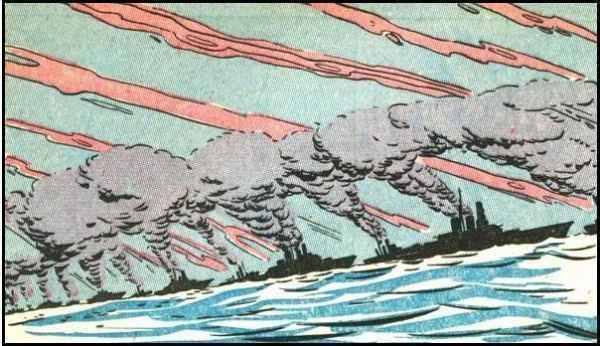
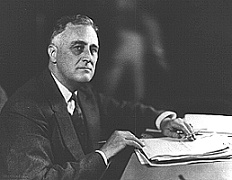
levi.bookin@gmail.com










Fair Use Notice: This site may contain copyrighted material the use of which has not always been specifically authorized by the copyright owner. We are making such material available in our efforts to advance understanding of historical, political, human rights, economic, democracy, scientific, environmental, and social justice issues, etc. We believe this constitutes a "fair use" of any such copyrighted material as provided for in section 107 of the US Copyright Law. In accordance with Title 17 U.S.C. Section 107, the material on this site is distributed without profit to those who have expressed a prior interest in receiving the included information for research and educational purposes. If you wish to use copyrighted material from this site for purposes of your own that go beyond 'fair use', you must obtain permission from the copyright owner.
Please Note: The list-owner and the moderator of 3rdReichStudies are not responsible for, and do not necessarily approve of, the random ads placed on our pages by our web server. They are the unfortunate price one pays for a 'free' website.



